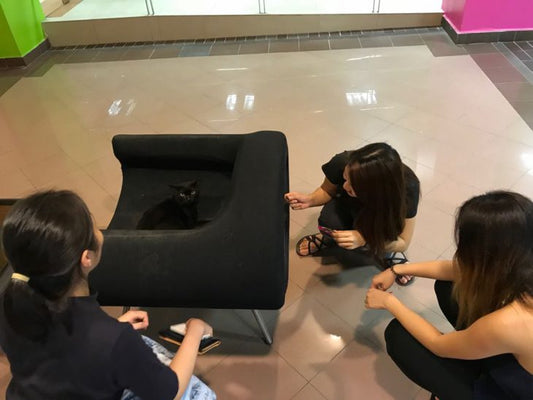Article Contribution By: NUS Cat Cafe
I have been with NUS CatCafe for the past two years and the experience has been nothing short of exhilarating. Before joining NUS CatCafe, I was unaware of the existence of community cats in our campus; much less the presence of a dedicated team, working closely to maintain a harmonious co-existence between the student body population and the cats. It was heartening to learn that individuals have taken the initiative to establish such a group.
My curiosity, interest and liking for cats (which was a bonus), drew me to join NUS CatCafe. As a member, I have had the opportunity to learn more about the cats, their personalities and idiosyncrasies. Such an experience has enlightened me on the presence of cats in campus and their patterns.
By extension, it has also fostered a connection with them on a more personal level. Caring and managing the cats does not solely entail interacting with them. Other important aspects include education and advocacy.
At the heart of such efforts is the motivation to create awareness amongst the student population. Cats are cute and naturally, one would be tempted to feed or interact with them. However, this may pose a danger to not just the student, but also the cat.
Being a community cat, their way of living differs quite drastically from domesticated cats. With that, comes precautions that one should be mindful of. The visibility of the cats in campus, emphasizes the importance of relaying this message to the students. Ultimately, if students appreciate the nature of community cats, it facilitates in creating a balance between both groups.
Besides communicating with students, Veterinary visits and engaging in Trapping-Neutering-Management-Return (TNRM) are also regular affairs within NUS CatCafe. These activities have served as a great platform for me to expand my knowledge about cats, in both the medical and social domains.
Our furry four-legged independent friends are complex creatures. However, I believe that all animals should be treated with dignity and the same courtesy should be extended to community cats as well. After all, each one of us is a member of the community and so are community cats.
– Meera (NUS Cat Cafe Rehoming Director)
About NUS Cat Cafe
Firstly, we are not a cat cafe with tea and coffee, but we do have lots of cats!
NUS CatCafe is a non-profit volunteer student organization dedicated to caring for stray cats on the NUS campus. In May 2009, a proposal submitted to NUS’ Office of Estate Development was approved and has been adopted. With the support of the Office of Campus Security, we have successfully managed cats in the Faculty of Science, Faculty of Arts and Social Sciences, School of Business and School of Design and Environment.
NUS CatCafe aims to provide a humane and effective method of controlling the cat population on campus via the Trap-Neuter-Return-and-Manage (TNRM) program.
This program involves identifying cat clusters on campus, trapping the cats for neutering, and then returning them to their territories where their well-being will be monitored. They will subsequently be fed regularly and responsibly by volunteers in our feeding roster.
Through this program, we hope to provide population control and continuing care to the stray cats in NUS, thus ensuring a stable and healthy cat population on campus.
Through sterilization, responsible feeding and proper cat management:
(i) The stray cat population on campus will reduce and stabilize in the long term. (ii) Complaints of food litter left behind by irresponsible feeders will be reduced as we encourage responsible feeding and registering all cat feeders under our network. (iii) Cats will not enter canteens, residential areas and refuse collection areas in search of food. (iv) Constant care and monitoring of the cats’ health will prevent the spread of infectious diseases.
The TNRM program is internationally recognized as a model for the care and management of stray cats. It has been instituted across universities in the United States, as well as locally, at Nanyang Technological University’s Cat Management Network, with much success.
Implementation of this program and its diligent upkeep will result in a healthy cat population that is not reproducing and is steadily declining through natural attrition (death of aged cats) and adoption into homes.
Presently, we would like to recruit volunteers for the following activities: To be regular cat feeders, and to trap and sterilize campus cats To monitor cats in school for any signs of illness or injuries To help us identify cat clusters in school To educate the public on responsible feeding
If you would like to assist us in any of the above tasks, please get in touch with us. Once NUS CatCafe establishes a system of cat management and a network of volunteers, more volunteer opportunities in education, fostering, publicity and fundraising will be made available.
Webpage http://blog.nus.edu.sg/nuscatcafe/
Facebook Group Page: http://tinyurl.com/nuscatcafe
Contact Person: Bob Gan Project Director, NUS CAT CAFE NUS PEACE (People Ending Animal Cruelty and Exploitation) Email: nuscatcafe@gmail.com Contact: +65 91151650
Photos courtesy Of NUS Cat Cafe
